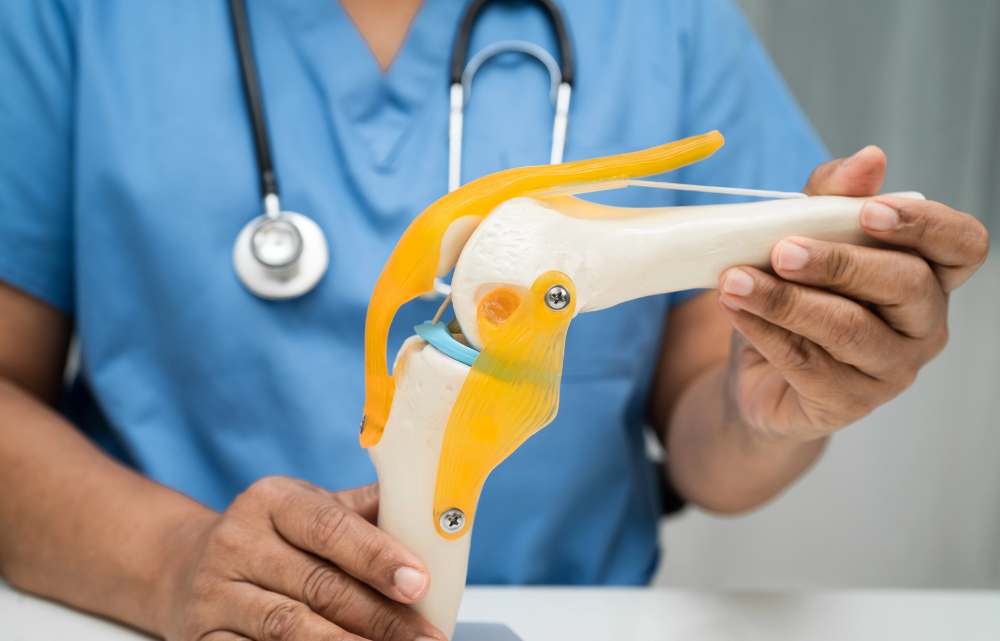Is Total Knee Replacement Surgery Right for You?
Home > Blog > Is Total Knee Replacement Surgery Right for You?

What Is Total Knee Replacement?
Total knee replacement is a surgery where the damaged or worn-out parts of your knee joint are replaced with artificial components. The knee is a hinge joint where the femur (thigh bone), tibia (shin bone), and patella (kneecap) come together. In a total knee replacement, the damaged bone and cartilage are removed and replaced with metal, plastic, or ceramic parts designed to mimic the function of the natural knee joint.
This surgery is typically performed when other treatments, like medications or physical therapy, don’t relieve pain or improve mobility. The goal of the surgery is to reduce pain, improve movement, and help people get back to their normal activities.
When Should You Consider Total Knee Replacement?
Persistent Pain
Difficulty with Daily Activities
Limited Range of Motion
Arthritis or Joint Damage
Knee osteoarthritis is the most common cause of severe knee pain and is often the reason for a knee replacement. Arthritis causes the cartilage in the knee joint to wear away, making the bones rub against each other, which leads to pain, swelling, and stiffness. If arthritis or other forms of joint damage are significantly affecting your quality of life, surgery might be the best option.
Ineffective Nonsurgical Treatments
How Is Total Knee Replacement Performed?
Total knee replacement is a major surgery, but it’s usually very effective in relieving pain and restoring function. Here’s a general overview of the procedure:
- Anesthesia: You will be given anesthesia to either put you to sleep or numb the area around your knee.
- Incision: The surgeon makes an incision in the knee to access the joint.
- Removal of Damaged Parts: The damaged portions of the femur, tibia, and patella are removed.
- Insertion of Prosthetic Parts: The surgeon replaces the removed bone and cartilage with artificial components. These parts are made of metal, plastic, or ceramic and are designed to mimic the natural knee joint.
- Closing the Incision: Once the prosthetic parts are in place, the surgeon will close the incision with stitches or staples.
The surgery usually takes about one to two hours. Afterward, you will be moved to a recovery room where the medical staff will monitor your condition.
What is the Recovery Process Like?
After total knee replacement, recovery can take time, but most people experience significant improvement in pain and mobility. Here’s what you can expect during the recovery process.
Hospital Stay
Physical Therapy
Returning to Normal Activities
Most people can start walking with the help of a walker or crutches within a day or two of surgery. After a few weeks, you may be able to return to light activities, like walking and driving. Full recovery can take up to 3 to 6 months, and you may need to avoid high-impact activities for some time.
Long-Term Care
Once you’ve fully recovered, you’ll need to take care of your new knee by continuing with regular exercises and avoiding activities that may put too much strain on the joint. Regular follow-up appointments with your doctor will help ensure that your new knee remains in good condition.
Risks and Considerations
While knee replacement surgery is generally safe, it does come with some risks. These can include infection, blood clots, nerve damage, or complications related to anesthesia. However, these risks are rare, and most people experience a significant reduction in pain and improvement in mobility after surgery.
It’s also important to note that the success of the surgery depends on factors like your age, overall health, and the condition of the knee joint. Your doctor will help you determine whether knee replacement surgery is the best option for you.
Conclusion
If you’ve been living with knee pain that affects your quality of life, total knee replacement surgery may be the right choice. The surgery can significantly reduce pain, improve mobility, and help you return to the activities you enjoy. However, it’s important to talk to your doctor and carefully consider your options before deciding if knee replacement surgery is right for you. With proper care and rehabilitation, many people find that knee replacement allows them to live pain-free and more actively.
Contact Southern California Orthopedic Surgeon today to schedule an appointment!
